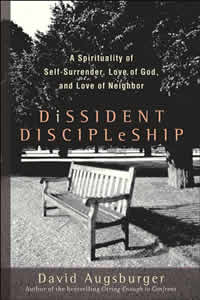Book Notes
 David Augsburger, Dissident Discipleship; A Spirituality of Self-Surrender, Love of God, and Love of Neighbor (Grand Rapids: Brazos, 2006), 245pp.
David Augsburger, Dissident Discipleship; A Spirituality of Self-Surrender, Love of God, and Love of Neighbor (Grand Rapids: Brazos, 2006), 245pp.
A friend once observed that our church teaching and preaching ought to "put the cookies on a higher shelf." Setting the bar higher is exactly what David Augsburger tries to do in his new book Dissident Discipleship. In contrast to what he calls "standard Christian spirituality," authentic or genuine discipleship is necessarily "dissident" because it radically subverts conventional wisdom and values. In the words of Jim Wallis, "What matters most today is whether one is a supporter of establishment Christianity or a practitioner of biblical faith. Establishment Christianity has made its peace with the established order. It no longer feels itself to be in conflict with the pretensions of the state, with the designs of economic and political power, or with the values and style of life enshrined in the national culture. Establishment Christianity is a religion of accommodation and conformity, which values realism and success more than faithfulness and obedience" (p. 204).
Drawing upon his deep roots in the Anabaptist tradition, Augsburger proposes a "tripolar" spirituality with three interdependent movements—upward towards God, inward towards self, and outward towards neighbor, in contrast to "monopolar" and "bipolar" spiritualities. In successive chapters he describes the seven traits or practices of this subversive spirituality: radical attachment, stubborn loyalty, tenacious serenity, habitual humility, resolute nonviolence, concrete service, and authentic witness. After a concluding chapter he includes six appendices. Given his Anabaptist heritage, Augsburger interacts with the sorts of scholarly sources that you would expect (Kraybill, Wallis, Stringfellow, Yoder, Will Campbell, Tolstoy, etc).
Theologically, the Anabaptist tradition epitomizes Niebuhr's "Christ against culture" paradigm, so believers who are inclined, say, to the paradigms of "Christ of culture" or "Christ above culture" will take exception to its underlying assumptions. Practically, in claiming that his is "not your ordinary garden variety, but the stubborn, persistent, radical spirituality appearing in unusual people across the last two thousand years," Augsburger inadvertently, and I am sure unintentionally, claims the high ground for an elite marine corp of spirituality. The majority of "usual" and "ordinary" believers who are enmeshed in the compromises and contradictions of every day lives, jobs, families, finances, etc. are consigned to the status of pikers and posers. Finally, I found Augsburger's book overwritten and awkward in style (eg, "I suspected that he knew I knew that he knew I knew." p. 100). In the end, though, he does a fine job of pointing us toward Truth North. Reading the Sermon of the Mount convinces me of that.


